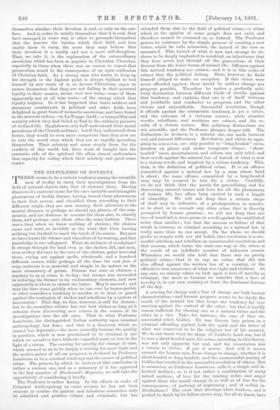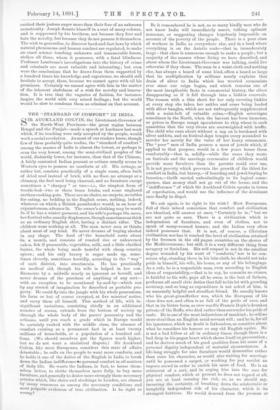THE SINFULNESS OF NOVELTY.
THERE seems to be a certain tendency among the scientific men of to-day to carry their investigations from the field of natural objects into that of abstract ideas. Having discovered a material cause for the once invisible and intangible phenomena of bodily disease, having traced those phenomena to their first source, and classified them according to their different origin, they are now turning their attention to the mental diseases, or perhaps we should say phases, of the com- munity, and are desirous to account for them also, to classify them, and perhaps cure them after the same fashion. There was a time when we knew nothing of cholera ; the cholera came and went, as invisible as the wind that blew, leaving nothing but its dead to mark the track of its course. But now we have learnt the whence and wherefore of its coming, and that knowledge is our safeguard. What do we know of revolution P It sweeps through the land even as the cholera did, and men, even as they did once in the case of the cholera, point here and there, crying out against spells, witchcraft, and a hundred different causes, while perhaps all the time the real fons et origo malorwm is as material and simple in its nature as the most elementary of germs. Disease was once as obscure a mystery to us as crime is to-day; but science has succeeded in reducing the former to its rudimentary elements, and now apparently is about to attack the latter. May it succeed ; and may the time come quickly when we can cure by homoeopathic or other remedies a tendency to murder or to steal, or guard against the contagion of strikes and rebellions by a system of inoculation That day, we fear, however, is HUH far distant; but in the meantime science has our best wishes us long as it refrains from discovering new crimes in the course of its investigations into the old ones. That is what Professor Lombroso, the distinguished Italian authority upon criminal anthropology, has done; and that is a discovery which we cannot but deprecate,—the more earnestly because the quality in question, which is now proclaimed to be criminal, is one which we ourselves have hitherto regarded more or less in the light of a virtue. The craving for novelty, for change of view, which seemed to us to be simply a craving for more light and the motive-power of all our progress, is declared by Professor Lombroso to be a criminal tendency and the source of political crime. The process by which he arrives at this conclusion is rather a curious one, and as a summary of it has appeared in the last number of Blackwood's Magazine, we will take the opportunity of considering it briefly.
The Professor is rather daring. In his efforts to make of Criminal Anthropology an exact science, he has not been content to confine his patient and laborious researches only to admitted and positive crimes and criminals, but has
extended them also to the field of political crime,—a crime which in the opinion of some people does not exist, and therefore cannot be reasoned on or defined. The Professor proves its existence by the simple process of creating a new virtue, which he calls misoneism, the hatred of the new or unwonted. This hatred of what is new and strange he de- clares to be deeply implanted in mankind, an inheritance that they have never lost through all the generations of their descent from the lower forms of animal life. Offences against this natural tendency are crimes ; and it is to this order of crimes that the political belong. Here, however, he finds himself obliged to make an exception. If this virtue were never offended against, there would be neither change nor progress possible. Therefore he makes a perfectly arbi- trary distinction between different kinds of revolts against that tendency, and explains that one is of itself virtuous and justifiable and conducive to progress, and the other vicious and unjustifiable. Successful revolution, though it offends against the misoneistic tendency, is yet a virtue, and the outcome of a virtuous nature ; while abortive revolts, rebellions, and mutinies are crimes, and the re- sults of a vicious nature. But arbitrary distinctions are not scientific, and the Professor plunges deeper still. The distinction, he declares, is a natural one, one made between real and natural differences. Revolution and virtue in oppo- sition to misoneism, are only possible to "long-headed" races, dwellers on plains and under temperate climes ; "short- headed" races, mountaineers, and others, can only rebel, and their revolt against the natural law of hatred of what is new is a vicious revolt, and inspired by a vicious tendency. This, then, is the definition of political crime. It is an offence committed against a natural law by a man whose head is short ; the same offence committed by a long-headed man may be counted to him for a virtue. Candidly, we do not think that the mania for generalising, and for discovering natural causes and laws for all the phenomena of human life, has often been carried to such a length of absurdity. We will not deny that a certain shape of skull may be indicative of a predisposition to murder, or to steal, or to commit any other crime that is directly prompted by human passions ; we will not deny that one race of mankind is more prone to revolt against its established order than another ; but that the success or failure of that revolt is virtuous or criminal according to a natural law, is really more than we can accept. On the whole, we should prefer to remain with our old belief, that revolution is a suc- cessful rebellion, and rebellion an unsuccessful revolution, and that success, which turns the scale one way or the other, is the result of an indefinite number of unknown causes. Wherefore we would also hold that there was no purely political crime,—that is to say, no crime that did not also offend against the written law of a country, or the offender's own conscience of what was right and virtuous. At any rate, we utterly refuse to look upon a love of novelty as criminal ; the more so because we consider that a love of novelty is, in our own country at least, the dominant feature of the day.
A craving for change and a fear of change are both human characteristies,—and human progress seems to be chiefly the result of the natural law that keeps one tendency for ever warring against the control of the other : but that is hardly reason sufficient for classing one as a natural virtue and the other as a vice. Take, for instance, the case of that un- successful rebel, Galileo. He was thrown into prison as a criminal offending against both the spirit and the letter of what was conceived to be the religious law of his country. We do not know what the shape of Galileo's head was, but if he was a short-headed man, his crime, according to this theory, was not only apparent but real, and his recantation was a return to virtue. E pur si muove. And still it moves onward, the human race, from change to change, whether it is short-headed or long-headed; and the unsuccessful mutiny of Galileo has resulted in the successful revolution of others. But is misoneisnz, as Professor Lombroso calls it, a simple and in- herited instinct ; or is it not rather a combination of many mixed motives ; of love for the existing order, and anger against those who would change it, as well as of fear for the consequences ; of jealousy of supremacy ; and of selfish in- dividualism ? The crow that develops white feathers, and is pecked to death by its fellow-crows, may, for all we know, have excited their jealous anger more than their fear of an unknown monstrosity. Joseph flaunts himself in a coat of many colours, and is suppressed by his brethren, not because they fear and bate the novelty, but because they do not possess it themselves. The wish to generalise, to discover bard-and-fast laws by which natural phenomena and human conduct are regulated, to make an exact science touching unknown and innumerable forces, strikes all those, whom it possesses, with a fatal blindness. Professor Lombroso's investigations into the history of crime and criminals are most valuable and interesting ; but even were the conclusions that he draws from them supported by a hundred times his knowledge and experience, we should still hesitate to accept them, because we cannot agree with all his premisses. Certainly we cannot agree with him in the matter .of the inherent sinfulness of a wish for novelty and innova- tion. It is true that the vagaries of fashion, for instance, inspire the world with very mixed feelings ; but the world would be slow to condemn them as criminal on that account.



































 Previous page
Previous page